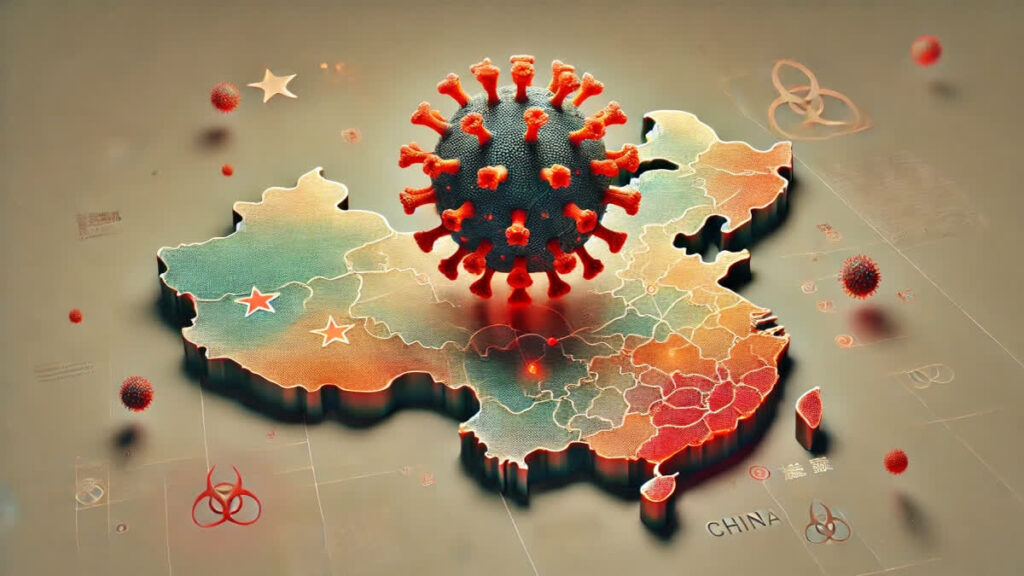Understanding the Human Metapneumovirus (HMPV) Outbreak
The human metapneumovirus (HMPV) outbreak has raised alarms in the healthcare sector, affecting millions globally. This respiratory virus, commonly overlooked, can cause severe complications, particularly in vulnerable populations like young children, the elderly, and those with weakened immune systems.

What Is Human Metapneumovirus (HMPV)?
HMPV is a respiratory virus first identified in 2001. It belongs to the Pneumoviridae family and is closely related to the respiratory syncytial virus (RSV). The virus spreads through respiratory droplets, contaminated surfaces, and close contact, making outbreaks in crowded areas common.
Human Metapneumovirus (HMPV) Outbreak: What You Need to Know
Human Metapneumovirus (HMPV) is a respiratory virus that can cause severe infections, particularly in children, the elderly, and individuals with weakened immune systems. HMPV has been a significant focus of attention due to periodic outbreaks, which can strain healthcare systems and raise public health concerns.
Symptoms of Human Metapneumovirus (HMPV)
Recognizing the symptoms of the human metapneumovirus (HMPV) outbreak is essential for timely diagnosis and treatment.

Common Symptoms
- Fever
- Cough
- Nasal congestion
- Shortness of breath
Severe Symptoms
In severe cases, the virus can lead to:
- Bronchiolitis
- Pneumonia
- Respiratory failure
How Does the Human Metapneumovirus (HMPV) Spread?
The human metapneumovirus (HMPV) outbreak spreads primarily through:
- Respiratory Droplets: Sneezing, coughing, or talking.
- Surface Contamination: Touching surfaces or objects contaminated with the virus.
- Close Contact: Being in close proximity to an infected person.
Who Is at Risk During an HMPV Outbreak?
While anyone can be affected, the following groups are at higher risk:
- Infants and young children
- Older adults
- People with chronic respiratory conditions
- Immunocompromised individuals
Impact of the Human Metapneumovirus (HMPV) Outbreak
The human metapneumovirus (HMPV) outbreak has significantly impacted healthcare systems globally. Hospitals report increased admissions due to respiratory complications, especially during the winter months.
Global Statistics and Trends
- Prevalence: Studies show that HMPV is responsible for 5–10% of acute respiratory infections annually.
- Economic Impact: The virus strains healthcare resources and causes economic losses due to missed workdays and medical expenses.
Prevention and Protection Against HMPV Outbreaks
1. Personal Hygiene Practices
Maintaining personal hygiene can reduce the risk of contracting HMPV.
- Wash hands regularly with soap and water.
- Use alcohol-based hand sanitizers when soap is unavailable.
- Avoid touching your face, especially eyes, nose, and mouth.
2. Respiratory Etiquette
Adopt proper respiratory etiquette to prevent spreading the virus.
- Cover your mouth and nose with a tissue when coughing or sneezing.
- Dispose of used tissues immediately and sanitize your hands.
3. Strengthen Your Immune System
A strong immune system can combat infections more effectively.
- Eat a balanced diet rich in vitamins and minerals.
- Exercise regularly to maintain overall health.
- Ensure adequate sleep to promote recovery and immunity.
4. Avoid Crowded Places During Outbreaks
Reduce exposure by limiting visits to crowded areas, especially during peak seasons.
Treatment Options for Human Metapneumovirus (HMPV
1. Symptom Management
Currently, no specific antiviral treatment exists for HMPV. Supportive care focuses on relieving symptoms:
- Over-the-counter medications for fever and pain relief.
- Staying hydrated to prevent dehydration.
- Using humidifiers to ease breathing.
2. Hospitalization for Severe Cases
In severe cases, hospitalization may be required for oxygen therapy or mechanical ventilation.
HMPV Outbreak: Role of Vaccines and Research
Current Status of Vaccines
As of now, there is no licensed vaccine for HMPV. However, researchers are actively working on vaccine development to combat future outbreaks effectively.
Ongoing Research
Scientific studies aim to better understand the virus’s behavior, transmission patterns, and immune responses to develop targeted therapies and vaccines.
Why Awareness of Human Metapneumovirus (HMPV) Matters
The human metapneumovirus (HMPV) outbreak underscores the importance of public health awareness. By understanding the virus, its symptoms, and preventive measures, we can reduce its impact and safeguard vulnerable populations.
Conclusion
The human metapneumovirus (HMPV) outbreak is a reminder of the need for vigilance and proactive measures in managing respiratory infections. From practicing good hygiene to staying informed about ongoing research, every effort counts in combating this global health challenge.
FAQ
What is human metapneumovirus (HMPV)?
Human metapneumovirus (HMPV) is a respiratory virus that causes infections similar to colds, bronchiolitis, or pneumonia. It spreads through respiratory droplets, contaminated surfaces, and close contact, particularly in crowded settings.
Who is most at risk during an HMPV outbreak?
Infants, young children, older adults, and individuals with weakened immune systems or chronic respiratory conditions are at higher risk of severe complications from HMPV infections.
What are the common symptoms of HMPV infection?
The symptoms of HMPV infection include fever, cough, nasal congestion, and shortness of breath. Severe cases can lead to bronchiolitis, pneumonia, or respiratory failure.
How can I prevent getting infected during an HMPV outbreak?
To prevent HMPV infections:
- Wash hands frequently with soap and water.
- Use hand sanitizers when soap is unavailable.
- Avoid crowded places during outbreaks.
- Practice respiratory etiquette, like covering your mouth when coughing or sneezing.
Is there a vaccine or specific treatment for HMPV?
Currently, no specific vaccine or antiviral treatment exists for HMPV. Supportive care, including hydration, fever management, and oxygen therapy for severe cases, is the primary approach. Vaccine development is underway in ongoing research efforts

Hello friends, my name is Shivam Kumar, and I am a writer, skilled in creating engaging, SEO-optimized content on online income and content creation since last two years. And I will be sharing this information form my blog.